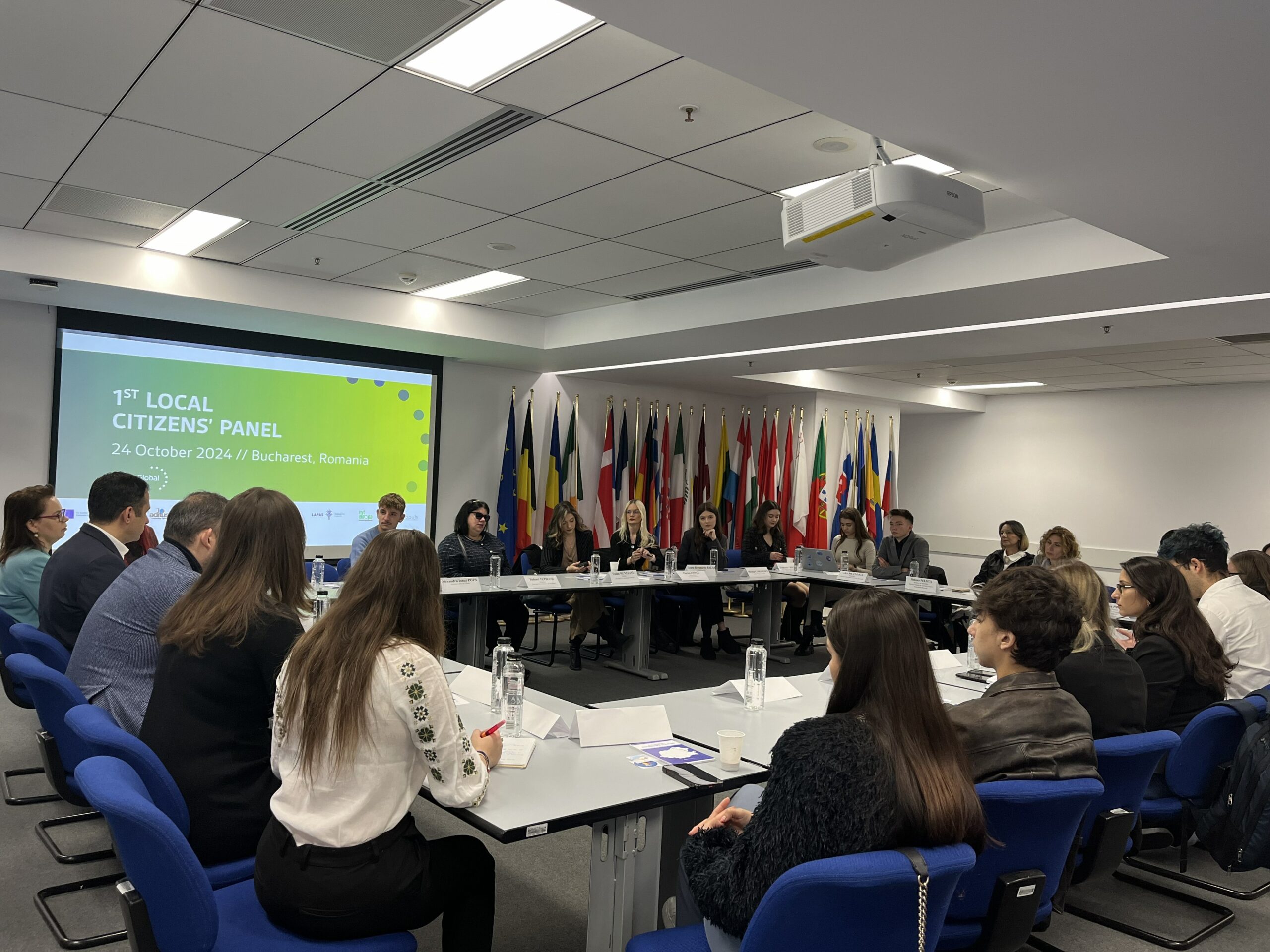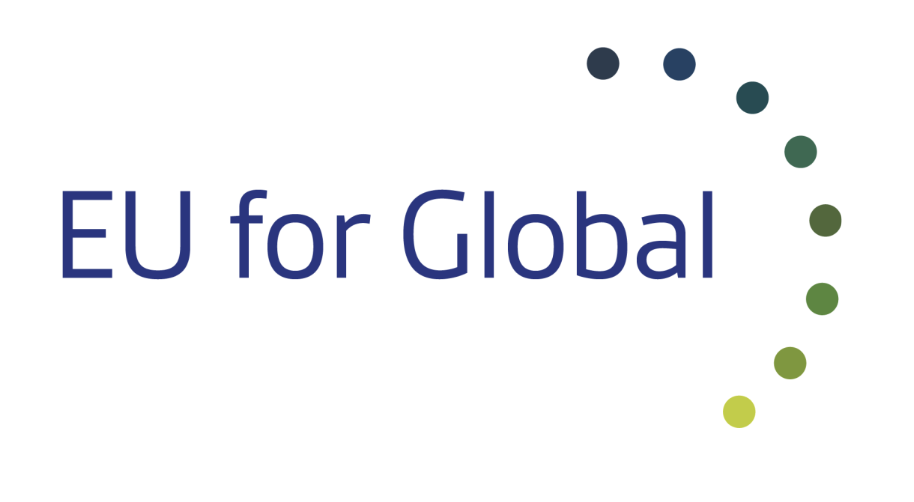
The EU for Global project started its series of Local Citizens’ Panels in Bucharest, Romania, hosted by partner organisation EUROPULS.
On 24 October 2024, the roundtable “Our Role in the EU” took place in Bucharest, Romania. It brought together the opinions of decision-makers, representatives of civil society, the public sector and of students to create a set of recommendations about their needs and how young people can contribute to the foreign policy and future of the European Union.
The first local event of the EU for Global project welcomed Mr. Ștefan Pălărie, senator (USR party), Ms. Oana Cambera, deputy (REPER party) and Mr. Mihai Dragos, Vice-President of the Economic and Social Council. Many civil society organisations were also present, such as:
- Curve of Culture
- Coffee Scholars
- The Association of the Blind in Romania
- National Council of Students
- Municipal Council of Students Bucharest
- General Directorate of Social Assistance of Bucharest Municipality
- Federation of Associations of Law Students in Romania
- Youth Organization of the Roma Party Association Pro-Europe
- Hope and Homes for Children Romania
- Interact District
Challenges faced by youth in democratic engagement
- Limited access to information and resources: Many young people, especially those from rural areas or vulnerable groups, face limited access to civic educational programs and essential information for active participation. These programs, which can help them understand their rights and responsibilities, are often unavailable in these communities, and the barriers to accessing informational resources reduce opportunities for democratic and social development.
- Lack of trust in institutional structures: Another major obstacle to civic engagement is young people’s distrust in decision-making institutions. Often, this lack of trust is caused by insufficient communication between institutions and citizens. Young people feel they are not effectively involved in decision-making processes, and their opinions are overlooked, which discourages participation and increases feelings of alienation from state structures.
- Limitations in representation and engagement: Many representative structures, such as ethics committees and university forums, offer limited and restricted presence for young people, depriving them of the chance to participate effectively. Moreover, young people do not receive sufficient support in learning how to get involved in public decision-making, and the processes are often inaccessible or lacking in transparency.
- Impact of disinformation and fake news: In the digital age, disinformation poses a real danger for young people. Exposure to fake news on social media, combined with a lack of media education, makes young people vulnerable to manipulation. In vulnerable communities, especially, young people have limited access to credible information sources, which increases their risk of being influenced by false information.
Key Solutions and Recommendations for Increasing Youth Democratic Participation
Following the discussions at the EU for Global roundtable, a series of recommendations were formulated to address these challenges and stimulate youth democratic engagement:
- Improving access to information and representation: It is essential to create partnerships between schools, NGOs, and local authorities to expand access to information and develop representation structures for young people. Through such collaborations, disadvantaged young people could benefit from targeted support and resources, reducing inequalities and creating real opportunities for engagement. These partnerships would allow young people to understand political processes, become well-informed, and have access to civic programs tailored to their needs.
- Promoting transparency at the local level and direct access to decision-making processes: Encouraging participation in local council meetings, which are open to the public by national legislation, can increase the transparency of decision-making processes. Organising information campaigns about these rights could attract more young people, who would thus have direct access to the decisions affecting their communities. In this way, young people could observe and understand how institutions work and could contribute to combating disinformation by actively participating in their community life.
- Creating and developing youth centres as spaces for development: Youth centres are important not only as meeting places but also as safe spaces where young people can develop civic initiatives and actively engage in the community. These centers support the formation of civic spirit and provide young people with a space to share their ideas and collaborate on projects with social impact. Through such initiatives, these centers help increase democratic involvement and support the inclusion of young people in decision-making processes.
- Enhancing media and digital education to combat disinformation: Introducing media education and digital literacy in schools is crucial for protecting young people from the impact of fake news and propaganda. Young people would thus have access to the necessary tools to navigate the online environment in an informed and responsible way. Although the European Union cannot intervene directly in national educational systems, international projects and awareness campaigns can provide valuable resources and support for developing young people’s media skills.
- Promoting critical thinking and collaborating with independent media organisations: Collaboration with independent media organisations and the development of partnerships between schools and these organisations are essential for promoting critical thinking among young people. Such educational programs help young people objectively evaluate information and become informed citizens, capable of recognizing and avoiding disinformation.
- Developing cross-border European programs for civic and digital education: To reduce the disparities between large urban centres and rural areas, the European Union can implement cross-border programs that facilitate the exchange of educational resources and promote successful models. These programs can ensure fair access to accurate information and development opportunities, especially for young people in less advantaged areas.
- Organising information campaigns and increasing opportunities for partnerships between youth organisations: Organising information campaigns and increasing opportunities for partnerships between youth organisations can amplify young people’s voices and ensure fair access to accurate information. Such measures can support democracy and provide a sustainable response to the challenges of disinformation.
- Increasing the visibility of youth-focused structures: The visibility of youth structures and projects is essential to ensure wider access to verified resources and opportunities. Promoting these structures can reduce disparities between rural and urban areas, contributing to fair access to resources for young people.
The impact of the recommendations created within EU for Global on the future of European youth
The recommendations formulated within the EU for Global project emphasise the need for educational and social reforms that support young people in developing a strong civic awareness and essential digital skills in the modern era. By implementing these measures, the European Union can contribute to shaping an informed generation, capable of facing global challenges and supporting European democracy.
The EU for Global project highlights the importance of education, cooperation, and equitable access to resources for young people from all social backgrounds, offering sustainable solutions for promoting democracy and combating disinformation. These initiatives reflect Europe’s commitment to supporting youth and building a future based on democratic values and accurate information.
The EU for Global project is funded by the European Union through the CERV programme.
